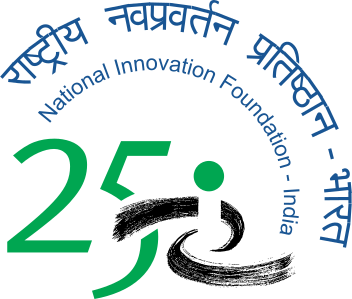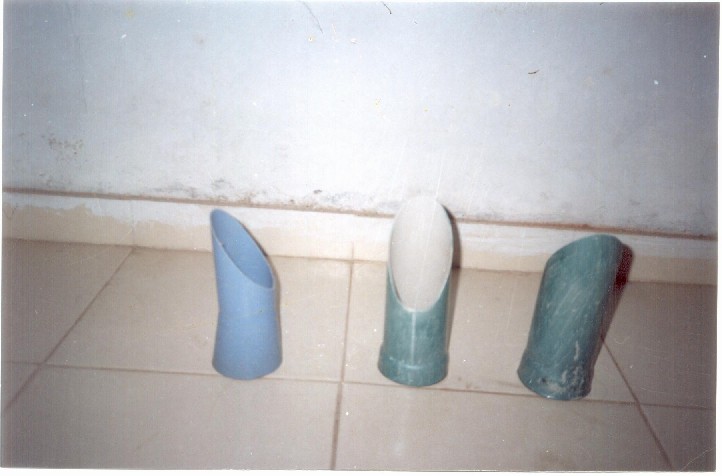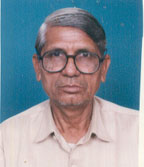Multiple innovations for everyday problems
Khimjibhai Kanadia (62 years), a retired schoolteacher, has more than 50 ideas and innovations to his credit, all of which have potential to reduce drudgery and improve work efficiency. Whenever he makes it big by successfully implementing any of his own several ideas, the innovator wants to establish a Trust where innovators would be enabled to transform their ideas into products without facing any financial constraints. Khimjibhai Kanadia lost his parents at a very young age. When he was eight years old, his parents died. He has two elder sisters and a younger brother. His uncle brought him up and got him educated up to middle school, after which he took up a job. He began studying for secondary school certificate (Class X) apart from helping out his uncle on the farm while performing well in the job. In 1962, he sat in the secondary school examination, he secured first place in the school examination. Continuing with part-time studies, he appeared for Primary Teachers' Certificate (PTC) examination in 1965. The certificate secured him the job of a teacher in 1967 in Dhuleta village, Idar taluka. In the meantime, he worked for a private organisation in Rajasthan, marketing handicrafts. Khimjibhai got married at the age of 15. As he and wife Shantaben found it difficult to make both ends meet from his meager income from the job, they opened a tailoring shop to supplement the family income. Despite having to struggle for long hours to eke out a living, Khimjibhai started a night school for promoting adult literacy in the village. Khimjibhai concedes that his family members have contributed very significantly in turning his wild ideas into useful innovations. His wife Shantaben and their four sons have been as responsible as himself in fructifying his dreams. Shantaben accompanies him on all business missions. Khimjibhai is proud that she is aware of all the technical aspects of the innovations. Three of the four sons currently hold responsible government jobs. One son, Rajinikar, assists him fulltime to run the workshop and to market the Kushal sprayer, Kittanal and other devices. A couple of years ago, Khimjibhai got an assignment from the forest department to raise a nursery of 10,000 seedlings in Gadha. The work involved filling small polyethylene or polypropylene bags with soil, which proved to be quite a tedious job. When the work began, he noticed that the mouth of the plastic bags often closed down while these were being manually filled and the soil fell outside. The result was that the labourers were not able to fill a bag with a single scoop of soil, as it should have been. Using a scoop or hand fills several times to fill one bag-wasted time and the output was poor. Khimjibhai felt the need to speed up the process drastically. He watched the operation meticulously and came out with a gadget to provide a simple solution. Kittanal was born as a result. Khimjibhai demonstrated the Kittanal to the District Forest Officer of Himmatnagar, who placed an order for 200 pieces right away. Gujarat Grassroots Innovation Augmentation Network (GIAN) sent a sample of the Kittanal to Ballarpur Industries Ltd, major player in paper-and-pulp industry, to get it evaluated. Manager—Raw Materials of the company said, "We do want such a device. Kittanal is more effective than the device currently used for filling polythene bags." BILT placed a trial order for 100 pieces. Self Employed Women's Association (SEWA) also felt that Kittanal could improve the earnings of the rural women who raise nurseries for the forest department and who are paid their wages on piece-rate basis. In 1965, Khimjibhai had designed and developed a sprayer, which he used to sell under the name Kushal Sprayer. He had manufactured approx 200 units and sold them in adjacent villages before quitting about 18 years ago. Some of them are still in use. In 1997, Khimjibhai came in contact with Society for Research and Initiatives for Sustainable Technology and Initiatives (SRISTI) and GIAN, which encouraged him to revive the project. GIAN arranged financial aid of Rs. 80,000 from Technopreneur Promotion Programme of DST as well as design inputs from National Institute of Design (NID) Ahmedabad. To initiate large-scale production, GIAN arranged a soft loan of Rs 2,20,000 from Technology Information Forecasting and Asse-ssment Council (TIFAC) of DST. He set up a new workshop in 1999. This workshop presently has machines for drilling, hand moulding, cut-off, welding etc., used in the manufacture of the sprayer. Kushal sprayer was relaunched in the market in 1999. He could reach a production level of 300 units a month. Students of Indian Institute of Management (IIM), Ahmedabad designed a marketing strategy for the product. It received a favourable response in Gujarat particularly because of its low cost, just Rs 450. These sprayers were sold initially with a book containing 75 solutions of herbal pesticides based on farmer's innovations taken from Honey Bee database. Khimjibhai received an award for the low-cost sprayer at the Science Fair held in village Vadali. He demonstrated his Kushal Sprayer at the SRISTI Shodh Sankal meeting and received orders on the spot for six units from farmers assembled there. Since last year, Khimjibhai has stopped production of Kushal Sprayer in his workshop. He had no other choice as the main electric motor of the factory burnt down repeatedly, due to severe fluctuations in the voltage and irregular frequency of the electric supply. At present, he gets job work done elsewhere and assembles the sprayers in his workshop. He manufactures them only on confirmed orders. Gum Scrapper The innovator has developed a small apparatus to make process of scrapping gum from Prosopis tree simpler and safer. A saucer shaped plate along with sharp blade on the top of bamboo stick or a plastic pipe, is used which prevents the gum from falling on the ground. It prevents injury and adds to safety and increases the efficiency. The cost comes up to around Rs.15. Paniharino Visamo (Water lifting aid for woman) The innovator has devised a simple apparatus to ease burden of rural women carrying load on their head. This could be done with two extended rods supporting the circular disk that is put on the head to keep the vessel. There is no need for help from a third person for the transition. The load rests on shoulder instead of head, when needed.








